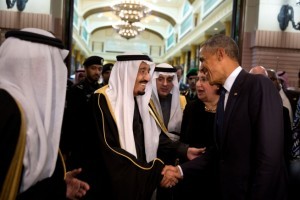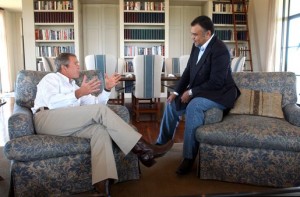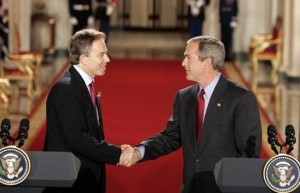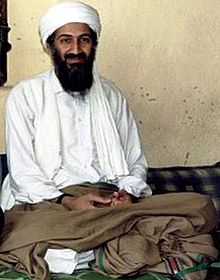Exclusive: Money may not be the root of all evil but it surely contributes to horrible war crimes when lucrative arms sales distort U.S. foreign policy and cause selective outrage over human rights atrocities, writes Jonathan Marshall.
By Jonathan Marshall
Forget oil. In the Middle East, the profits and jobs reaped from tens of billions of dollars in arms sales are becoming the key drivers of U.S. and British policy. Oil still matters, of course. So do geopolitical interests, including military bases, and powerful political lobbies funded by Israel, Saudi Arabia, and the other Gulf states.
But you can’t explain Washington’s deference to Saudi Arabia, despite its criminal war in Yemen and its admitted support for Islamist extremism, without acknowledging the political pull generated by more than $115 billion in U.S. military deals with Saudi Arabia authorized since President Obama took office.

Saudi King Salman bids farewell to President Barack Obama at Erga Palace after a state visit to Saudi Arabia on Jan. 27, 2015. (Official White House Photo by Pete Souza)
As arms sales expert William Hartung observed earlier this year, “U.S. arms deliveries to Saudi Arabia have increased by 96% compared to the Bush years. . . In 2014 alone more than 2,500 Saudi military personnel received training in the United States.”
These deals have generated huge new business opportunities for politically powerful U.S. contractors such as Lockheed Martin, General Dynamics, Boeing, and Raytheon. Neither the White House nor Congress will let mere war crimes stand in the way of continued sales that fund thousands of jobs.
The Pentagon approved its latest $1.2 billion deal, including more than 130 Abrams tanks (produced by General Dynamics), in early August, just as Saudi Arabia resumed airstrikes on the ancient Yemeni capital of Sanaa, killing nine civilians at a potato chip factory.
A spokesperson for Human Rights Watch said at the time, “The Saudi-led coalition’s campaign in Yemen has been devastating for civilians (and) the U.S. should be suspending arms sales to Saudi Arabia, not approving more.”
On Sept. 22, 71 members of the U.S. Senate rejected that advice and approved the deal, even as another Saudi-led air strike killed at least 26 civilians and wounded 60 more in a residential neighborhood of the port city of Hodeidah. A few days later the coalition killed another 10 civilians in the provincial capital city of Ibb.
The Guardian reports that “more than one-third of all Saudi-led air raids on Yemen have hit civilian sites” — a figure that strongly suggests such targeting is a matter of policy, not mere bad luck. These attacks are fomenting rising support for Al Qaeda and other extremists in Yemen, subverting Western security interests.
Yet U.S. Ambassador to the United Nations Samantha Power, who rips Moscow and Damascus for “barbarism” and “laying waste to what is left of an iconic Middle Eastern city,” is strangely silent when the target is Sanaa rather than Aleppo, and the perpetrator is Riyadh rather than Assad.
Great Britain Fuels the Fires
The same is true of the U.K. ambassador to the UN, who accused the Syrian government of a “sick bloodlust against its people,” while his own government blocked a European Union investigation of war crimes in Yemen.

President George W. Bush meeting with then-Saudi Ambassador Prince Bandar bin Sultan at the Bush Ranch in Crawford, Texas. (U.S. government photo)
One reason may be that Great Britain has sold almost $3 billion worth of arms to Saudi Arabia since it intervened in Yemen’s civil war a year and a half ago. Those sales provide plenty of reason to duck accountability.
A hard-hitting British parliamentary report this month concluded that British weapons — including notoriously indiscriminate cluster munitions — have almost certainly contributed to attacks by the Saudi coalition on targets such as “camps for internally displaced persons and refugees; civilian gatherings, including weddings; civilian vehicles, including buses; civilian residential areas; medical facilities; schools; mosques; markets, factories and food storage warehouses.”
The report called on the British government to stop ignoring blatant evidence of Saudi war crimes and suspend arms sales pending “an independent, United-Nations-led inquiry” into violations of international law.
“[Her Majesty’s] Government has obligations under the Arms Trade Treaty, as well as European and domestic law, to ensure there is no risk that arms it has licensed might be used in contravention of international humanitarian law,” the report declared.
“Saudi Arabia is one of our closest allies. However, the weight of evidence of violations of IHL (international humanitarian law) by the Saudi-led coalition in Yemen is now so great that it is very difficult to continue to support Saudi Arabia while maintaining the credibility of our arms licensing regime.”
The BAE Bribery Scandal
The link between British foreign policy and arms sales was conclusively established during a multi-year investigation of suspected bribes and kickbacks by arms giant BAE Systems, related primarily to its $80 billion Al Yamamah (“Dove”) arms deal, initially signed in 1985 by the Thatcher government, to sell fighter planes to Saudi Arabia. In 2010, BAE pleaded guilty to two criminal charges and agreed to pay nearly $450 million in penalties.

British Prime Minister Tony Blair and U.S. President George W. Bush shake hands after a joint White House press conference on Nov. 12, 2004. (White House photo)
In 2006, British Prime Minister Tony Blair ordered a halt to his government’s investigation of BAE’s alleged corrupt practices, including payments to Saudi Prince Bandar bin Sultan, former ambassador to the United States and a close confidant of the Bush family.
Bandar was not charged in the BAE case, and denied doing anything improper, but his suspicious receipt of $17 million in an account at Riggs Bank in Washington D.C. — ostensibly for “home improvement” — triggered the start of a bribery investigation of BAE.
(Riggs Bank had previously been identified as the source of funds sent from Bandar’s wife to two of the 9/11 hijackers. The recently declassified pages of the 9/11 commission report revealed indirect ties between Bandar and a senior Al Qaeda operative — a finding that former Sen. Bob Graham called “one of the most stunning parts of the investigation.”)
In 2008, a federal judge froze Bandar’s U.S. assets after a small Michigan pension fund with holdings in BAE sued its directors for allegedly letting the company pay $2 billion in bribes to Bandar.
According to the London Sunday Times, Bandar was instrumental in stopping an investigation by Britain’s Serious Fraud Office of BAE’s dealings with Saudi Arabia. The prince reportedly went to Prime Minister Blair in 2006 to say, “Get it stopped.” He allegedly warned the fighter plane contract would be terminated and “intelligence and diplomatic relations would be pulled.”
Following a spate of media revelations, Blair defended his decision to shut down the investigation of BAE on national security grounds.
“This investigation, if it had it gone ahead, would have involved the most serious allegations in investigations being made into the Saudi royal family,” he said. “Quite apart from the fact that we would have lost thousands, thousands of British jobs.” (A U.S. investigation continued, leading to the company’s eventual guilty plea.)
Blair has continued his cozy relations with Riyadh over the years. In 2008, as Special Envoy to the Middle East, he “lavished praise” on Saudi Arabia’s King Abdullah, touting his many “reforms.” Just two years later, the former prime minister signed a lucrative contract with a company owned by the son of King Abdullah to promote Saudi oil sales in China. (In 2015, The Telegraph estimated Blair’s fortune at £60 million, noting that “his financial affairs can appear as complex and opaque as his global influence is remarkable.”)
Meanwhile, the Conservative government of David Cameron signed a $3 billion electronic warfare equipment sale to Saudi Arabia in 2010 — with provisions to siphon off tens of millions of dollars to the Cayman Islands for the benefit of Saudi officials. The Ministry of Defense insisted that any investigation of whistleblower complaints would “compromise” relations between the two countries.
Plus ça change . . .
Today’s wildly lucrative military market in the Middle East is reminiscent of the arms bazaar of the 1970s, when Saudi Arabia, Iran and other OPEC countries recycled billions of “petrodollars” by purchasing entire armories from the United States and Great Britain (thus setting the stage for the eventual emergence of radical Islamist critics like Osama bin Laden).
The parallels between then and now are sometimes eerie. In 1979, President Jimmy Carter invoked his executive authority to approve the sale of nearly half a billion dollars’ worth of arms to North Yemen without congressional review, following that country’s clashes with South Yemen. That sale turned that small and poor country into the third largest recipient of U.S. arms after Israel and Saudi Arabia.
The administration claimed the sale was essential to restoring Saudi confidence in U.S. foreign policy after the fall of the shah of Iran — just as President Obama today keeps reassuring Riyadh of U.S. support following the nuclear deal with Iran.
A few prescient observers questioned whether shoveling more arms into such Middle East conflicts was really in America’s best interests. Said Rep. Les Aspin, a Wisconsin Democrat and member of the House Armed Services Committee,
“Yemen is an unwise spot on which to stake our prestige. It is yet another case where the United States … will be unable to exert much control over events with sophisticated military gear. And yet the sale of such equipment sucks us into the whirlpool and puts American prestige on the line. Selling such vast quantities of advanced weapons is almost certainly not the best way of dealing with the sort of tribal conflicts that have beset Yemen for years.”
Those words ring as true today as they did 37 years ago. But the name of the game in Washington is money, not taming tribal conflicts. One of the most compelling challenges of our time will be to find a way to take the money out of war so we can refocus our national priorities on peace.
Jonathan Marshall is author or co-author of five books on international affairs, including The Lebanese Connection: Corruption, Civil War and the International Drug Traffic (Stanford University Press, 2012). Some of his previous articles for Consortiumnews were “Risky Blowback from Russian Sanctions”; “Neocons Want Regime Change in Iran”; “Saudi Cash Wins France’s Favor”; “The Saudis’ Hurt Feelings”; “Saudi Arabia’s Nuclear Bluster”; “The US Hand in the Syrian Mess”; and “Hidden Origins of Syria’s Civil War.” ]


“U.S. Ambassador to the United Nations Samantha Power, who rips Moscow and Damascus for “barbarism” and “laying waste to what is left of an iconic Middle Eastern city,” is strangely silent when the target is Sanaa rather than Aleppo, and the perpetrator is Riyadh rather than Assad.” —
No need to go as far as Yemen — although the scale of the operation is much larger there —
she’s also strangely silent about the war crimes being carried out by the Saudi/GCC backed jihadis in Aleppo. Something that the MSM in the U.S. is also strangely — or not so strangely — silent about as well.
Actually, I probably shouldn’t have put in the phrase about “the scale of the operation” being much larger in Yemen. It probably would’ve been more apt to have said Saudi involvement is more direct… or to have left the phrase out altogether. Saudi/GCC involvement in Syria is on a massive scale.
Canada has recently leapt into second place in the list of arms exporters to Middle East governments. Much of those export sales are conducted by U.S. corporations operating in Canada, including the $15 billion deal by General Dynamics to supply Saudi Arabia with armoured cars manufactured in London, Ontario.
The armoured car sale to Saudi Arabia was approved by the previous Conservative Party government of Prime Minister Stephen Harper. The new Liberal Party government of Prime Minister Justin Trudeau has affirmed that approval, saying that to do otherwise would harm Canada’s reputation as a reliable peddler of arms and other goods to international markets. The Globe and Mail daily newspaper has brought to light the Liberal decision and its political implications. The decision has been controversial, staining the public relations efforts of the new government to portray itself and its photogenic prime minister as purveyors of niceness in the world.
A lengthy analysis of the seamless continuity of Conservative and Liberal foreign policy and national security policy is here: Bombs away! How Canada is here to help the world, by Mathew Behrens, Rabble.ca, Sept 23, 2016.
Some writers have pointed out that we have Stone Age bodies and minds. Our technological capability has progressed; our bodies and minds have not.
If you would know human nature, there are countless books. You can go back to the ancient Greeks, Romans, and the biblical book of Ecclesiastes. Some of my favorite authors: Jonathan Swift, Mark Twain, George Orwell, and Joseph Heller.
“The fault … is not in our stars, [b]ut in ourselves …” –Shakespeare, “Julius Caesar”
It is certainly not pleasant to contemplate, but there it is. There are far too few outliers.
The US State Department exists to create chaos in this world. What would they do if they weren’t killing people? https://waitforthedownfall.wordpress.com/the-purpose-of-the-u-s-state-department/
Writer forgot to say how kickbacks from Death-Merchants gets into bank accounts of Congres-People, Presidents and other poli8tical whores.
The quotation “Money is the root of all evil” is drastically incomplete, and therefore wholly misleading.
The full quotation – which should be taught in all primary schools – is ” For the love of money is the root of all evil: which while some coveted after, they have erred from the faith, and pierced themselves through with many sorrows”. (1 Timothy 6:10)
The essential difference is that whereas money itself is a valuable tool that makes life far easier for everyone, the LOVE of money is a perversion. It’s just as weird and unnatural as loving a car engine, a domestic animal or the sensation of pain. Similarly, food and drink are essential, and sex is fun and necessary to perpetuate the race; but it is crazy to fall slave to any of those things and let them grow in importance to eclipse everything else in life.
THE US KILLING MACHINE
Before going further I would urge that we all read (again if necessary)
two basic books:
1. William Greider : FORTRESS AMERICA: THE AMERICAN MILITARY
AND THE CONSEQUENCES OF PEACE ( PublicAffairs, NY, 1998)
2.John Tirman : THE SPOILS OF WAR: THE HUMAN COST OF
AMERICA’S ARMS TRADE (The Free Press, NY etc. 1997)
Because of the years these books were written, political realities
have changed. You will find that despite this, the basics of how
we (US) functions is clear and succinctly stated. (Both books
are well written and “easy” if unsettling reading.)
US PRESIDENTIAL CAMPAIGNS, 2016..AND MORE
Whatever your views, it is clear that neither major candidate
has dealt with the military. Even Mr. Revolution himself,
former candidate Bernie Sanders of VT, maintains the
immunity of the US killing machine which provides American
jobs, incomes, money for education etc. Obviously
he ia concerned with Vermont but almost all states
are in the same position.
There no significant discussion of reducing the killing
abroad. In fact all such issues were relegated to the
back burner. Until the US develops equally
large investments in non-fatal (to others) industries,
millions of Americans continue to rely on killing others as
America’s primary reason for being. All veterans are
sanctified in almost all sports events, for example. The American
collective goal is to kill.
—Peter Loeb, Boston, MA, USA
For many decades now the Middle East has been the most heavily armed region of the planet. Weapons sales to the region are demand-driven, not supply-driven. If General Dynamics didn’t sell them the equipment, the Chinese would. So what’s the big deal?
China, already has sold weapons to middle eastern states, but certainly can’t compete with our sales, and by golly we’re even saving jobs in America by selling them more, as Mr. Marshall indicated. The big deal Fergus for me is that we are really helping to create a demand by our destructive and deadly foreign policy in the ME.
P. S. I once heard an interview with a publisher of child pornography who was asked why he did it, and his reply was, well, if it wasn’t him then it would be someone else. I think you can see the faultiness of his argument.
For many decades now the USA has been the biggest drug consumption region of the planet. Drug sales to the region are demand-driven, not supply-driven. If South American drug barons didn’t sell them the stuff, the Afghans would. So what’s the big deal?
Fergus,
All you’ve said is opposite of reality.
War, not peace, drives the economy.
War is the beast that feeds on our taxes
and drives the herd mentality of militarism
Where “sacrifice” is to be expected in a
War economy of public approved belligerence
As are video records of Public Executions
as coverage of live presentations of murder
by your Officers of Law Enforcement / paid
to protect and serve a raw & earthy environ,
In unfamiliar neighborhoods strange-to your-culture,
foreign by ways & means and manners of speech.
We live in different worlds-apart in Belief Systems
but one Mankind, formed in the dust of the Earth.
Wow, I really liked your poem!!!!!!!!!!!!
Ok, Fergus, not sure if your comment is tongue in cheek or not, but the big deal is that Americans don’t have a direct voice in these decisions. These decisions are on a need to know basis and “we don’t need to know”.
But we do know – we work for the munitions manufacturers. We work on the docks that ship these weapons out. We fight in the wars. We make the containers that the weapons go in. We build the homes that the weapons makers live in. We grow the food that the bomb makers eat and the plane builders eat. We’re all in it up to our eyeballs and yet, for example, the Tea Party people are very self righteous about saving unborn lives and we are all about triumphalism and being exceptional – or tolerate being called exceptional – but we’re all a party to it except maybe the people who do everything they can to try to do something about it – people who write the truth and try to inform the rest of us and some people even risk everything like our whistle blowers.
In truth, we’re a mess. And our endless wars and predatory banking system and Citizens United corrupted politicians keep the whole thing going.
Our “decent, honest, New Deal democrat” was IMO, likely screwed out of the nomination, given the MSM complicity in trying to prop up the whole mess with lies and distortions.
It’s now really up to the young people activists who showed up this past primary willing to speak out on behalf of sustainability (climate/peace/economic and racial justice) – they seem willing and eager and courageous enough to face the truth about what’s so wrong and willing to fight for an end to these unsustainable and corrupt goings on.
The violence and crimes we are a party to in the Middle East are horrific.
Who would have ever thought we would be a party to and a witness to such horror?
—————————
On a side note, regarding Saudi Arabia, I remember Larry King’s interview of Prince Bandar. Larry asked him about the corruption in Saudi Arabia. Bandar answered – ” we take the same 20% as everyone else around the world ”
I guess he was referring to the ruling elite…..
Since I wrote this article, the White House has approved a $4 billion sale of fighter planes to Qatar, Bahrain and Kuwait–reportedly so that Boeing won’t have to shut down its production lines in St. Louis.
What is the European Space Agency? How is it funded?
http://www.esa.int/About_Us/Welcome_to_ESA/Funding
What is the Rosetta orbiter?
http://www.pbs.org/newshour/rundown/rosetta-first-comet-orbiting-probe-ends-life-smash/
The no arms sale should be extended to every government in the area, especially Israel, the locus of the violence.
I suggest it would be more constructive to we accept the obvious and operate from that point: arms sales IS American foreign policy … along with perpetual war waged with the arms we do not sell, sometimes in conjunction with allies who are using our arms.
Perhaps I’m misreading your post, but in order to do what you stated, if I’m interpreting you correctly, we would have to be grounded in a sense of morality, and from an historical perspective we are not. Our recent wars would indicate nothing has changed.
I so agree with you, Annie, you are squarely on point in both comments.
The more things change yet stay the same as the world grows into Space Age yet the dark ages remain. Science expands knowledge yet the machinery of death cranks out millions of victims in dark/ recessed pockets of human existences —
as the Advanced or advantaged ones live with ever increasing progress, Who Are “the meek,which will inherit the earth” and will be left behind?
We exist in the literal Space Age foreseen and imagined by scientific dreamers.
The European Space Agency’s Rosetta orbiter ‘committed suicide’ as a final act for the cause of scientific curiosity.
What is the European Space Agency? Who are it’s member States? How is it funded? Where are it’s headquarters? When were they established?
http://www.space.com/34267-rosetta-comet-mission-final-photos.html
I thought this was a very fine article, and certainly don’t disagree, however as I read it I thought why would the US feel guilty because by selling the Saudi’s weapons we are complicit in civilian deaths in Yemen. We have a long record of imposing deaths on civilian populations, and we can start with the indigenous people we encountered in the Americas, and all those lives lost to slavery. Before we even get to the 20th century there was the war of 1812 and the US Mexican wars in which we were the aggressors and some 40 thousand died. Bringing us into the 20th century I’ll just mention WWII and the bombing of civilian populations in Japan, and our nuking of Hiroshima and Nagasaki to show Russia a lesson. There’s Vietnam of course, where the civilian population continues to die from unexploded ordnance and the continued affects of agent orange. This is a short list, so it should come as no surprise, or cause any wonder as to why we would care that we are complicit in civilian deaths in Yemen by providing weapons to our friends the Saudis .
As an add on, lets not forget we’re not good at paying attention to international law, or the Geneva accords. We certainly thought those sanctions imposed on Iraq in the 1990’s, which caused the death of 500 thousand children, was worth it. I better stop because our capacity for creating civilian deaths overtly, or covertly through the CIA and it’s operatives would turn this into an essay.
The Anglo-American Establishment could correctly be known as, Murder Incorporated or Murder, Inc. which was the name the press gave to organized crime groups in the 1930s to the 1940s that acted as the “enforcement arm” of the Italian-American Mafia, Jewish mob, and connected organized crime groups in New York and elsewhere.
These days, no one in the World is safe from targeting by the Anglo-American Incorporated Murderers. The truth is blatantly clear yet denied in broadly cast volumes of false accusations and cover-ups and the propagation of fable/false information into the willing psyche of they who live within the safety of Those Who Build and Drop the Bombs and Call the Shots. – As they willingly destroy nations and entire cultures of People in-the-name-of OPENING MARKETS.
The Anglo-American/Euro Establishment, Murder Inc.